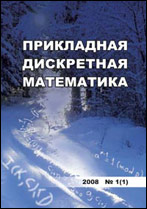|
This article is cited in 4 scientific papers (total in 4 papers)
Mathematical Backgrounds of Computer and Control System Reliability
Synthesis of easily testable logic networks under arbitrary stuck-at faults at inputs and outputs of gates
K. A. Popkov
Keldysh Institute of Applied Mathematics, Moscow, Russia
Abstract:
Two binary vectors are called $k$-adjacent if they differ in at most $k$ components, where $k\in\mathbb{N}$. For $\alpha\in\{0,1\}$ and $s\in\mathbb{N}$, let $\alpha^s$ be the Boolean vector $(\alpha,\ldots,\alpha)$ with $s$ coordinates $\alpha$. For each natural $k$, consider the bases $B(k)=\{\varphi(x_1,\ldots,x_{2k+2}),x_1\ldots x_{k+1}\vee\overline x_1\ldots\overline x_{k+1},\overline x,0\}$ and $B'(k)=\{\varphi(x_1,\ldots,x_{2k+2}),\xi(x_1,\ldots,x_{3k+2}),\eta(x_1,\ldots,x_{4k+2}),\overline x,0\}$, where $\varphi(x_1,\ldots,x_{2k+2})$ is an arbitrary non-self-dual Boolean function taking the value $\alpha$ on the vector $\alpha^{2k+2}$ and the value $\overline\alpha$ on all other vectors $k$-adjacent to this vector; $\xi(x_1,\ldots,x_{3k+2})$ is an arbitrary Boolean function taking the value $\alpha$ on the vector $\alpha^{3k+2}$, the value $\overline\alpha$ on all other vectors $k$-adjacent to this vector, and the value $\alpha$ on all vectors $k$-adjacent to the vector $(\alpha^{k+1},\overline\alpha^{2k+1})$; $\eta(x_1,\ldots,x_{4k+2})$ is an arbitrary Boolean function taking the value $1$ on the vector $\alpha^{4k+2}$, the value $0$ on all other vectors $k$-adjacent to this vector, and the value $\alpha$ on all vectors $k$-adjacent to the vector $(\alpha_{2k+1},\overline\alpha^{2k+1})$.
Let $D_{k\text{(I)}}(f)$ ($D_{k\text{(IO)}}(f)$, $D'_{k\text{(I)}}(f)$, $D'_{k\text{(IO)}}(f)$) be the least length of a fault detection test (fault detection test, diagnostic test, diagnostic test, respectively) for irredundant logic networks consisting of logic gates in the basis $B(k)$ (basis $B(k)$, basis $B'(k)$, basis $B'(k)$, respectively), implementing given Boolean function $f(x_1,\ldots,x_n)$, and having at most $k$ arbitrary stuck-at faults on inputs of gates (on inputs and/or outputs of gates, on inputs of gates, on inputs and/or outputs of gates, respectively).
Let a Boolean function $f(x_1,\ldots,x_n)$ be called palindromic if it takes the same value on any two opposite binary $n$-tuples.
The following facts are obtained. The quantity $D_{k\text{(I)}}(f)$ equals $0$ iff $f$ is an identical function (i.e., $f\equiv x_i$ for some $i\in\{1,\ldots,n\}$) and equals $2$ otherwise. The quantity $D_{k\text{(IO)}}(f)$ equals $0$ iff $f$ is an identical function, equals $1$ iff $f\equiv 0$, equals $2$ iff $f$ is not an identical or palindromic function, equals $3$ iff $f$ is a palindromic function and $f\not\equiv 0,1$, and is undefined iff $f\equiv 1$. The quantity $D'_{k\text{(I)}}(f)$ equals $0$ iff $f$ is an identical function and equals $2$ otherwise. The quantity $D'_{1\text{(IO)}}(f)$ equals $0$ iff $f$ is an identical function, equals $1$ iff $f\equiv 0$, equals $2$ iff $f\equiv\overline x_i$ for some $i\in\{1,\ldots,n\}$, equals $3$ iff $f$ is not a self-dual function and $f\not\equiv 0,1$, equals $4$ iff $f$ is a self-dual function and $f\notin\{x_1,\ldots,x_n,\overline x_1,\ldots,\overline x_n\}$, and is undefined iff $f\equiv 1$. For each $k\in\mathbb N$, the equality $D'_{k\text{(IO)}}(f)=4$ holds true under $n\geqslant 3$, and in the case $k\geqslant 2$, the proportion of those Boolean functions $f$ in $n$ variables, for which $D'_{k\text{(IO)}}(f)=4$, tends to $1$ under $n\to\infty$.
Keywords:
logic network, arbitrary stuck-at fault, fault detection test, diagnostic test.
Citation:
K. A. Popkov, “Synthesis of easily testable logic networks under arbitrary stuck-at faults at inputs and outputs of gates”, Prikl. Diskr. Mat., 2019, no. 43, 78–100
Linking options:
https://www.mathnet.ru/eng/pdm654 https://www.mathnet.ru/eng/pdm/y2019/i1/p78
|

|




 Contact us:
Contact us: Terms of Use
Terms of Use
 Registration to the website
Registration to the website Logotypes
Logotypes








 Citation in format
Citation in format 
